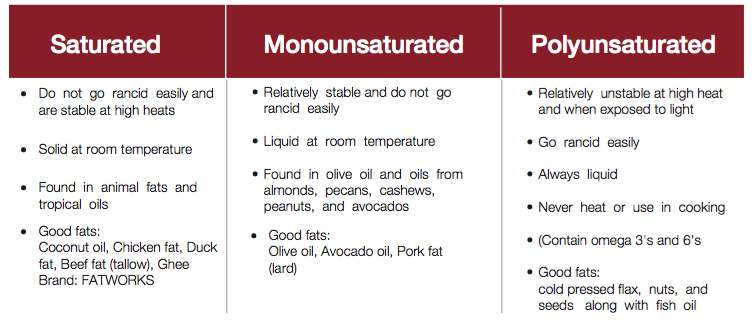What are Healthy Cooking Fats?
A Guide To Purchasing Cooking Fats and Oils
I get this question all of the time and for good reason. In our society, fats have been demonized, adulterated, and chemically altered for convenience and economic gain at the expense of our health. We are confused because we have relied on expert knowledge and scientific research that has caused distrust due to political misrepresentation. Let’s try to get back to our roots and connect with how nature intended us to relate to our food. Let’s try to deconstruct our biases around food and remember what our ancestors ate.
Nature Knows Best
ALL fatty foods found in nature have a balance of all 3 classifications of fats: saturated, monounsaturated(olive oil/avocado oil), and poly-unsaturated. Nature knows best, so when I see that nature provides us with all of these types of fats in natural unprocessed foods, I can trust that they are all good for me. This means that ALL are necessary for our health and shouldn't be demonized (including saturated fats). If nature isn’t enough proof, there are plenty of studies to validate the necessity of saturated, mono-unsaturated, and poly-unsaturated fats in an optimal diet.
The only exception to this observation is processed polyunsaturated vegetable oils. These oils include sunflower oil, safflower oil, canola oil, vegetable oil, and grapeseed oil. Additionally, polyunsaturated fats are found in hemp, pumpkin, chia seed, and flax oils. Most polyunsaturated oils are subjected to HIGH HEAT and LIGHT which damages their chemical structure and makes them rancid. Expeller pressed oils stored in clear containers are toxic to our bodies the moment they are processed and stored on the shelf.
What Are Some Examples of Healthy Oils and Fats?
Quality butter, ghee, duck fat, tallow, unrefined coconut oil, lard, olive oil, avocado oil are supportive to most bodies.
Which Oils Can I Cook With?
To keep it simple you can always look at the consistency of the fat in cooler climates to decide whether to cook with it.
Solid at room temperature:
These fats are best to cook with because their chemical structure is more stable.
Grass Fed Butter
Ghee
Duck fat
Tallow
Coconut oil
Lard
Liquid at room temperature:
These oils are best for dressings and sauces. They can be ok to cook with on low temperatures.
Olive oil
Avocado oil
Lard
Fish, nuts and seeds:
These foods contain healthy unadulterated polyunsaturated oils.
What Oils Should I Avoid?
Avoid liquid oils in clear containers AND solid non-dairy butter such as these:
Sunflower oil
Safflower oil
Canola oil
Vegetable oil
Grapeseed oil
Cottonseed oil
Expeller pressed oils
Corn oil
Soybean oil
Butter substitutes (e.g. I Can’t Believe It’s Not Butter, Earth Balance, Smart Balance, Crisco, Margarine etc.)
You should avoid these oils and never cook with them. Many restaurants use these oils in salad dressings, fryers, and for other cooking purposes due to their affordability. Avoid vegan butters and hydrogenated (hardened) or partially hydrogenated vegetable oils like margarine, crisco, or EarthBalance. These oils are chemically altered and have been known to contribute to sexual dysfunction, increased blood cholesterol and paralysis of the immune system.
Healthy is a Misnomer, Quality is What We Want
As we can see, healthy fat pursuit is really not what we should be searching for. Balanced and quality fats should be the goal. Studies show that animals eating their natural diet have more omega-3 fatty acids. The fact is most americans are eating far too many carbohydrates and omega-6 fatty acids which contribute to fatty acid deficiency, inflammation, leaky gut, and detoxification issues in the liver. While omega-3 and omega-6’s are essential fatty acids (EFA’s) they should only be consumed as a moderate part of the diet and in a balanced ratio of 1:9 or less (omega 3’s to omega 6’s). The standard american diet contains safflower oil (3 to 6 ratio of 1 : 115) and sunflower oil ( 3 to 6 ratio of 1 : 311.5) which have a disproportionate amount of omega 6’s. Since this increase of omega-6 fatty acids in the american diet we have seen an increase of heart disease, autoimmunity, diabetes, and Alzheimers.
The “oiling of america” as Sally Fallon says, has done more damage to our health than good. Economical and political swaying has stripped us of our right of health and I believe it is our responsibility as individuals to start demanding change. When we start to ask questions at restaurants and pressure larger businesses to make a change from modern processed polyunsaturated oils to more traditional cooking fats, like organic animal fats, our health as a society can improve dramatically! It all starts in our houses, though. Once you make the shifts and start feeling less inflamed, more energy, more consistent mental health, and less skin issues, you will see for yourself the power of unprocessed quality food.


